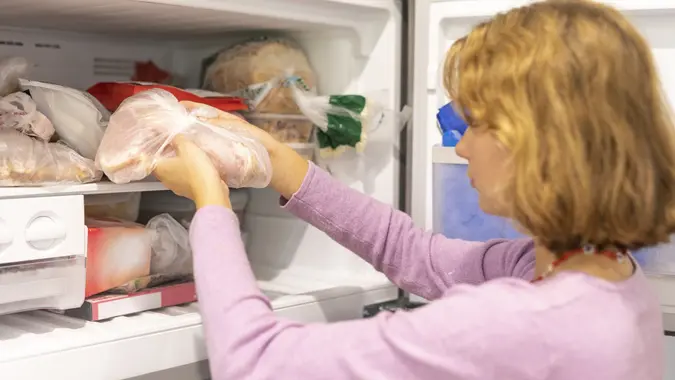Make Groceries Last and Save Money With 6 Essential Preservation Tips

Commitment to Our Readers
GOBankingRates' editorial team is committed to bringing you unbiased reviews and information. We use data-driven methodologies to evaluate financial products and services - our reviews and ratings are not influenced by advertisers. You can read more about our editorial guidelines and our products and services review methodology.

20 Years
Helping You Live Richer

Reviewed
by Experts

Trusted by
Millions of Readers
With grocery prices soaring, making food stretch is crucial. But for many, that’s hard to accomplish simply because they don’t know where to start. Consider taking tips from someone who doesn’t have a choice but to make their groceries last.
Hilary Messer-Barrow wrote a piece for Insider about living in a food desert in Yukon, Canada where the nearest grocery store is five hours away. Messer-Barrow only shops for food every two months, and so must make every trip count. Here’s how she and her husband make their food last:
1. Planning and Inventory
Before every big haul mission, Messer-Barrow and her husband thoroughly go through their pantry and freezer to itemize what they have and what they need. During this time, they plan ahead. What holiday or special occasion is coming up within the next two months that they may need food or drinks for? Write it all down on a shopping list and make sure to make space. This intense planning isn’t just helpful for knowing what to buy, it helps eliminate any impulse buying by making the shopping experience intentional and fully thought out.
2. Organize by Expiration Date
Once home with their haul, Messer-Barrow and her husband stock their fridge so that items that will go bad first are at the front and the items that will last longer are deeper in. Also, when they know something is close to expiring, they can adjust how it is stored, perhaps freezing or canning it, or using it in a recipe right away.
3. Meal Plan and Batch Cook
Messer-Barrow and her husband waste no time getting to work with their fresh grocery items by cooking them up in batches. They typically make a mix of dishes like lentil soup and roasted-vegetable bowls, along with more special ones like risotto or quiche.
They then freeze their future soups, stews and casseroles.
4. Stock the Freezer and Pantry with Staples
Meal planning doesn’t mean there shouldn’t be room for spontaneity. Messer-Barrow and her husband may want to make something last-minute, and so always have the basics on hand in their well-organized freezer and pantry. This includes lentils, flour and sugar, along with beans, pastas and oils. They make everything from scratch, which helps with their health, too.
5. Eat Fresh Produce First, Then Turn the Rest Into Stocks and Compotes
Fresh produce goes bad quickly, so Messer-Barrow and her husband eat lots of salads and dishes that call for fresh produce in the days immediately following their grocery haul. After that, they turn what’s left into sauces, compotes, stocks and crumbles. To continue to get veggies into their diet, they eat frozen vegetables, which are just as good as fresh ones.
6. Store Produce Properly
Messer-Barrow doesn’t have a root cellar, but she does know how to store produce in a way that keeps it fresh longest. Store potatoes in a cool, dark place with lots of circulation. Onions and garlic are best stored in a cool, dry cupboard area away from the potatoes. Put carrots, beets and cabbage somewhere cool with their leafy tops removed, or put them in the fridge if you have the space. Store chives and asparagus in the fridge covered in a plastic bag in a glass with about an inch of water.
More From GOBankingRates
 Written by
Written by  Edited by
Edited by 

























